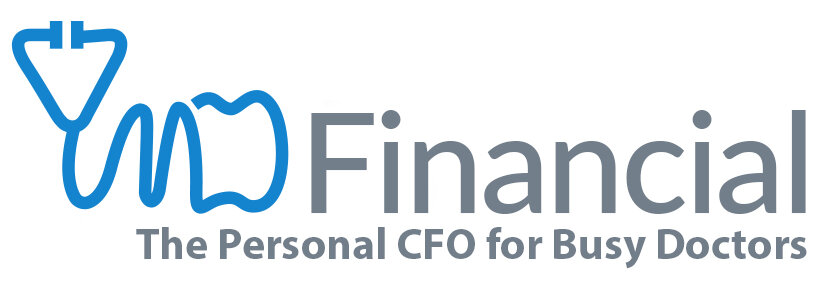Written by Josh Lantz, CRPC®/ Chief Investment Officer, Financial Advisor
By far a doctor’s largest asset is their income. However, often this asset is neglected. Your income is what allows you to realize wealth over time.
Let’s assume a doctor goes into practice at age 35 and retires at age 65. That provides them 30 years of earnings. To keep things simple, I’m showing numbers before adjusting for inflation, earnings growth, and taxes.
That’s a lot of money earned over time. Given it’s your largest asset, it’s wise to spend time focusing on it.
Protecting Income
One area of focus is protecting this income. That’s why you’ve heard us emphasize insuring your income against the risk of sickness or injury. That’s what long term disability insurance is for. It’s especially important for doctors.
Another area of focus is how to keep more of your income. That’s where tax planning and tax advantaged savings strategies come into play. Tiny savings of 1-2% are meaningful when you’re talking about such big numbers.
Increasing Income
A less common area of focus is how to increase the annual gross income in the first place. Modest increases early in your career can compound to very large amounts in the future, because future annual income is typically growing on top of a higher starting point.
One way you can focus on increasing your income is becoming more needed at your employer. This is typically done by getting more education, but many of you have already done a tremendous amount of education.
Another way to focus on increasing your income is doing more. In other words, typically more hours equal higher pay. If that sounds tiring and unsustainable, here are a couple other options-
Two other ways to increase income involve:
Negotiating
Shopping employers
The importance of Negotiating
First, I think it’s important to highlight that not all negotiations are win-lose. You can negotiate in a way that is win-win, where all parties benefit.
If you think about it, there are lots of negotiations in life. You probably do yearly negotiations with your employer, but it’s not just with your employer. Yes, a lot of financial matters are negotiations, but many situations that involve cooperating with others are forms of small negotiations.
There are entire books written on negotiating. There are tons of YouTube and social media posts with tips. For many doctors, they may not have invested anything in this life skill. It’s worth pausing and asking yourself if you’ve invested enough in this skill. You may want to invest a few hours of this next year on becoming a better negotiator. This is an investment that would probably earn a very high rate of return.
Shopping Jobs
The other way to increase income is to shop jobs. Typically, the new employer needs to provide you higher compensation to entice you to join them and motivate you to leave your current position. Shopping employers often results in higher pay. It also provides you the true market wages for what you’re worth. There’s no better way to know what you can get paid than to shop the job marketplace.
Vital to negotiating and changing jobs is having the same information as the employer. This is generally referred to as symmetrical information. Contrast to asymmetric information where one party has more information than the other.
It’s important when negotiating you have as close to symmetrical information as possible. That’s where compensation benchmarking can be useful.
MGMA Compensation Data
In May of 2024 we purchased one year of MGMA benchmarking data. MGMA is often considered the top benchmarking data for determining compensation for doctors. MGMA data provides compensation by specialty across the United States. It can be sorted by four regions, academic versus non-academic compensation, years in specialty, and percentile.
We think having compensation data is key to having symmetrical information. This puts you on stronger footing with your employer.
You might use the data to:
1. Affirm if you’re compensated at fair market wages today
2. Know how much you can ask for at a new job
3. Know how much you can ask for at your existing job during your annual contract negotiations
Example MGMA Data
Below are four examples of non-academic total compensation data broken apart by percentiles. This data is for all regions and all experience levels.
Next Steps
Like I mentioned we purchased a one-year subscription for MGMA in May 2024. Our renewal is coming up this May (2025) so we will only have this data available for a limited time.
It’s likely we will not be renewing our subscription to MGMA due to limited demand. We tried this out for one year. We didn’t get a lot of interest.
If you have not already reviewed the MGMA compensation data with your advisor, we would encourage you to request data from us for negotiating higher pay. Let us know if you would like the MGMA compensation report for your specialty.
Now is the time to request this data even if you might not use it for a few months. Happy negotiating!
Josh Lantz, CRPC®/ Chief Investment Officer, Financial Advisor With over a decade of financial planning experience, Josh has worked on more than 500 doctors’ financial plans. “It’s very hard to find a doctor’s situation I haven’t seen before,” says Josh. This is only a snapshot of the expertise Josh brings to MD Financial. He can be reached at Josh@mdfinancialadvisors.com.
The views expressed are those of the author as of the date noted, are subject to change based on market and other various conditions. Material discussed is meant to provide general information and it is not to be construed as specific investment, tax, or legal advice. Keep in mind that current and historical facts may not be indicative of future results. The information contained in our presentations has been compiled from third-party sources and is believed to be reliable; however, accuracy is not guaranteed.



